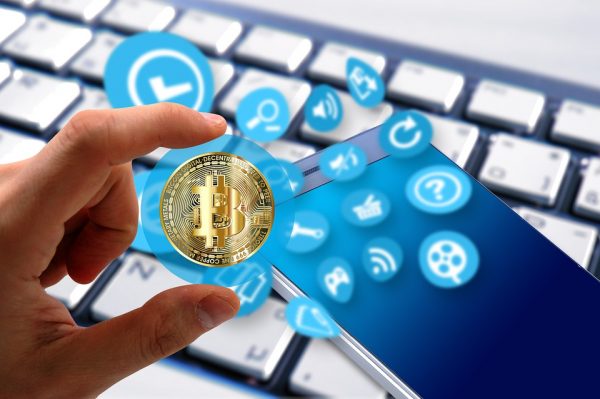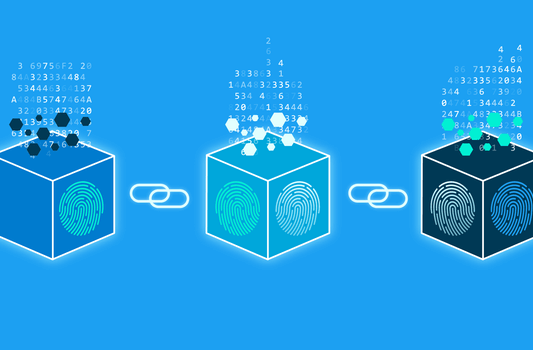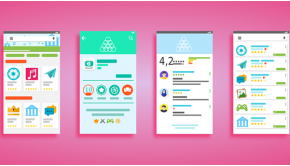Blockchain in the forefront of globalization
The world is getting increasingly interconnected as we plunge into this era of informational technologies. Anywhere you look, be it entertainment, financial, or even political industries, there’s a trend of the digital technologies dominating everything – production of information, distribution, marketing, etc.
One of the most prominent facets of this trend is, without a doubt, blockchain. This peer-to-peer technology, which knows no governments or any other centralized bodies, was promised to change the financial world right after it was created. And its own digital currencies such as Bitcoin, Ethereum, and EOS are increasingly utilized by various industries. For instance, Bitcoin is used to play online games, some providers even allow players to generate their own cryptocurrencies.

But besides supporting cryptocurrencies and pushing their perks such as decentralization, security, and instant transactions, there are far more applications of the blockchain than meets the eye.
The world coming together
Since we’re here talking about trends of the 21st century, another pretty well-defined trend we’re witnessing today is globalization. After the world governments realized that the blood-thirsty global wars were not the way out of their differing interests, they decided to chart the course towards unification.
The “founding fathers” of globalization believed that only through cooperation and discussion were they able to solve the most pressing problems of their times. And so came the economic interdependence into being. What it meant was that the countries would allow, and even push for, the free movement of people, goods, and information without extensive border limitations. And in retrospect, this decision promoted further prosperity in the countries that agreed to these terms.
But how are blockchain and globalization related to each other? Well, the connection is quite innate, actually. Blockchain is a decentralized, peer-to-peer ledger that is only governed by its users – i.e. connected computing devices. This means that the government-related restrictions, border controls, and many other issues are practically non-existent to the blockchain.
No political manipulations to currencies
Globalization, as mentioned earlier, is characterized by the free movement of goods, services, and information. And modern international trade does a more or less pretty good job at providing that convenience.
However, because the conventional currencies are the main facilitators of these movements, and since they’re under the compliance of the governmental monetary policies, they come with their own set of issues such as politically-induced inflation and other currency manipulation techniques. This has a detrimental effect on globalization.
Blockchain, on the other hand, is a totally decentralized entity. This means that its supply, price, and stability is guaranteed by its regular users and not some officials with their political agendas. That’s why blockchain-powered cryptocurrencies are the most suitable tools that can get rid of the additional costs that hinder the freedom of movement.
Even though there are some problematic issues that forestall the mass adoption of cryptocurrencies in regular transactions, one of them being the high volatility of Bitcoin, there are other altcoins that solve their counterparts’ problems. For example, stablecoins were created in order to solve Bitcoin’s volatility problems. So, it’s not the reason not to incorporate blockchain into the global exchange.
Expanding the possibilities for foreign remittances
Foreign remittances is yet another field where blockchain can prove its significance in terms of accelerating globalization. As of today, the majority of international money transfers are done through banks. And they make use of this dominance by imposing additional fees and commissions on these transactions. Not only that, a transaction itself can take several days, depending on how complicated it is.
Blockchain, on the other hand, is free of such limitations and burdens. For starters, it’s very fast and convenient, enabling its users to transfer money from one part of the world to another in just several minutes.
And when it comes to transaction fees, well, there are no such things as those. Crypto exchanges offer foreign money transfers that entail no additional costs. They only get profit through spreads that accompany the actual exchange of cryptocurrencies into conventional money. That’s why many foreign workers rely on cryptos such as Bitcoin when sending money to their families at home – BTC is instantaneous and far less expensive.
As we mentioned above, blockchain is more than just cryptocurrencies. The platform can be used for various purposes, be it managing employee systems, improving supply chains, or even boosting the production effectiveness. According to the analysis report from McKinsey & Company, the digital flow of information even goes as far as to influence GDP growth. In fact, its impact is even larger than the trade of goods.
Easy to make international business
Among the alternative uses of the blockchain, there is the ease of doing business worldwide. When entrepreneurs and business people try to migrate information and other assets from one country to another, they have to ensure that their cross-border transfers are in accord with the existing laws and regulations of the destination country. This entails extensive research of unique rules, tax codes, licensing issues, etc.
But it’s possible to avoid these burdensome undertakings by choosing blockchain. Since it’s not connected to any nation and isn’t tied to any government’s legal constraints, blockchain can facilitate free movement of information from one country to another without having to go through additional restrictions.
It’s also worth noting that not only large companies but also smaller businesses can benefit from the blockchain. They can easily create international companies, reach foreign customers, and broaden their coverage through this digital ledger and be subject to no cross-border distortions.
Globalization and blockchain working in a tandem
To put it in a nutshell, globalization and blockchain are complementary forces that work seamlessly to improve people’s lives. For starters, globalization clears borders, accelerates international trade, and facilitates free movement of goods, services, and information.
And then comes blockchain as a catalyst to this process. Because it knows no governments, blockchain allows its users to make instant cross-border transactions and purchases without additional costs. Besides, it also enables businesses to transfer their assets and not worry about the destination country’s comprehensive regulatory framework.














